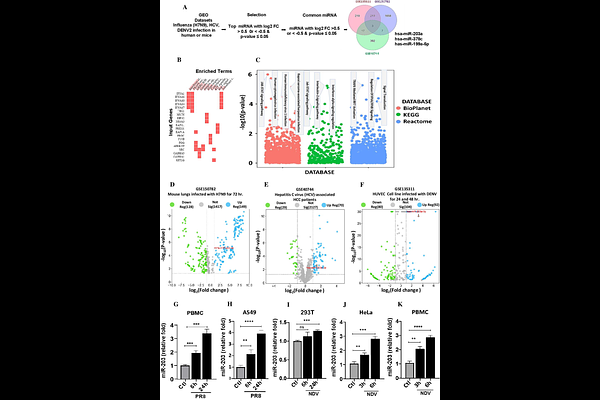Essential role of hsa-miR-203a-3p in type I Interferons immune homeostasis during Influenza and NDV infection

Essential role of hsa-miR-203a-3p in type I Interferons immune homeostasis during Influenza and NDV infection
Kumar, P.; Kumar, A.; Kumar, A.; Kumar, H.
AbstractMicroRNAs (miRNAs) are small, non-coding molecules that act as essential post-transcriptional regulators in various biological processes. Many studies suggest that miRNAs may modulate the host immune response during virus infections. We analyzed publicly available transcriptomics data involving infection with different RNA viruses and identified the most prominent candidate, miR-203a-3p. This miRNA is upregulated during H7N9, HCV, and DENV2 infections. Interestingly, pathway analysis of microRNA-targeted genes shows that miR-203a-3p targets multiple genes of the type I interferon and JAK-STAT pathway. In this study, we reported the novel role of miR-203a-3p as it is elevated in response to polyinosinic-polycytidylic acid [poly(I:C)] transfection and infection with various RNA viruses such as Newcastle Disease Virus (NDV) and A/PR8/H1N1 influenza virus. We found that miR-203a-3p promotes the A/PR8/H1N1 virus replication by suppressing the host type I interferons and interferon-stimulated genes. We demonstrated that miR-203a-3p overexpression reduced the expression of ISGs and is attributed to the direct binding of miR-203a-3p to 3' UTRs of Janus-activated kinase 1 (JAK1), STAT1, SOCS3, and multiple IFNA transcripts. Altogether, these findings strongly suggest that miR-203a-3p plays a pivotal role in immune homeostasis by regulation of type I IFN and supports A/PR8/H1N1 and NDV infection by targeting multiple genes of the host type I IFNs and JAK-STAT signaling pathways.